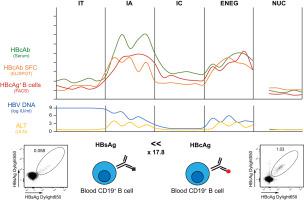当前位置:
X-MOL 学术
›
J. Hepatol.
›
论文详情
Our official English website, www.x-mol.net, welcomes your
feedback! (Note: you will need to create a separate account there.)
Hepatitis B core-specific memory B cell responses associate with clinical parameters in patients with chronic HBV
Journal of Hepatology ( IF 26.8 ) Pub Date : 2020-02-13 , DOI: 10.1016/j.jhep.2020.01.024 Thomas Vanwolleghem 1 , Zwier M A Groothuismink 2 , Kim Kreefft 2 , Magdeleine Hung 3 , Nikolai Novikov 3 , Andre Boonstra 2
Journal of Hepatology ( IF 26.8 ) Pub Date : 2020-02-13 , DOI: 10.1016/j.jhep.2020.01.024 Thomas Vanwolleghem 1 , Zwier M A Groothuismink 2 , Kim Kreefft 2 , Magdeleine Hung 3 , Nikolai Novikov 3 , Andre Boonstra 2
Affiliation

|
Little is known about the frequency, phenotype and function of HBV-specific B cells during chronic infection. Here we study HBcAg and HBsAg-specific B cells in different clinical phases of a chronic HBV infection. We included 118 treatment naïve and 34 nucleos(t)ide analogue-treated patients with chronic HBV and 23 healthy HBsAg-vaccinated controls. Global and HBV-specific B lymphocytes were examined by FACS using fluorescently labeled HBsAg and HBcAg as baits. Functional HBV-specific B cell responses were quantified in B cell ELISPOT assays. Anti-HBs and anti-HBc antibodies were measured in serum and in ELISPOT supernatant by ELISA. Higher HBcAg-directed B cell responses were found in HBV clinical phases with elevated . low serum alanine aminotransferase (ALT) levels, irrespective of the HBeAg-status. In contrast, HBsAg-directed responses were lower and did not significantly fluctuate. In individual patients a mean 17.8-fold more circulating B cells target HBcAg than HBsAg baits. These HBcAg-specific B cells present a classical memory B cell profile and have slightly higher CD69 expression levels compared to global memory B cells. Viral suppression and ALT normalization upon treatment led to a numeric and functional reduction of HBcAg-specific B cell responses, accompanied by progressive decreases in serum anti-HBc antibodies. HBcAg-specific memory B cells present a classical memory B cell phenotype, vary in number and function throughout HBV's natural history and are significantly reduced during antiviral treatment. In recent years, studies examining the role of B cells during chronic hepatitis B virus infection have regained interest. We show that circulating B cells more often target the hepatitis B core antigen than the hepatitis surface antigen. Moreover, these hepatitis B core-specific B cells associate with the natural history of chronic HBV, and their responses decline during effective antiviral treatment.
中文翻译:

乙型肝炎核心特异性记忆 B 细胞反应与慢性乙型肝炎患者的临床参数相关
对于慢性感染期间 HBV 特异性 B 细胞的频率、表型和功能知之甚少。在这里,我们研究慢性 HBV 感染不同临床阶段的 HBcAg 和 HBsAg 特异性 B 细胞。我们纳入了 118 名未接受过治疗的慢性 HBV 患者和 34 名接受过核苷(酸)类似物治疗的慢性 HBV 患者以及 23 名接种过 HBsAg 疫苗的健康对照者。使用荧光标记的 HBsAg 和 HBcAg 作为诱饵,通过 FACS 检查整体和 HBV 特异性 B 淋巴细胞。在 B 细胞 ELISPOT 测定中对功能性 HBV 特异性 B 细胞反应进行量化。通过 ELISA 测量血清和 ELISPOT 上清液中的抗 HBs 和抗 HBc 抗体。在 HBV 临床阶段发现较高的 HBcAg 导向的 B 细胞反应,且 .无论 HBeAg 状态如何,血清丙氨酸氨基转移酶 (ALT) 水平较低。相反,针对 HBsAg 的反应较低,并且没有显着波动。在个体患者中,针对 HBcAg 的循环 B 细胞平均比 HBsAg 诱饵多 17.8 倍。这些 HBcAg 特异性 B 细胞呈现出经典的记忆 B 细胞特征,并且与整体记忆 B 细胞相比,CD69 表达水平略高。治疗后病毒抑制和 ALT 正常化导致 HBcAg 特异性 B 细胞反应的数量和功能减少,同时血清抗 HBc 抗体逐渐减少。 HBcAg 特异性记忆 B 细胞呈现出经典的记忆 B 细胞表型,在整个 HBV 自然史中其数量和功能各不相同,并且在抗病毒治疗期间显着减少。近年来,检查 B 细胞在慢性乙型肝炎病毒感染过程中的作用的研究重新引起了人们的兴趣。我们发现,循环 B 细胞更常靶向乙型肝炎核心抗原,而不是肝炎表面抗原。 此外,这些乙型肝炎核心特异性 B 细胞与慢性乙型肝炎的自然病程相关,在有效的抗病毒治疗期间,它们的反应会下降。
更新日期:2020-02-13
中文翻译:

乙型肝炎核心特异性记忆 B 细胞反应与慢性乙型肝炎患者的临床参数相关
对于慢性感染期间 HBV 特异性 B 细胞的频率、表型和功能知之甚少。在这里,我们研究慢性 HBV 感染不同临床阶段的 HBcAg 和 HBsAg 特异性 B 细胞。我们纳入了 118 名未接受过治疗的慢性 HBV 患者和 34 名接受过核苷(酸)类似物治疗的慢性 HBV 患者以及 23 名接种过 HBsAg 疫苗的健康对照者。使用荧光标记的 HBsAg 和 HBcAg 作为诱饵,通过 FACS 检查整体和 HBV 特异性 B 淋巴细胞。在 B 细胞 ELISPOT 测定中对功能性 HBV 特异性 B 细胞反应进行量化。通过 ELISA 测量血清和 ELISPOT 上清液中的抗 HBs 和抗 HBc 抗体。在 HBV 临床阶段发现较高的 HBcAg 导向的 B 细胞反应,且 .无论 HBeAg 状态如何,血清丙氨酸氨基转移酶 (ALT) 水平较低。相反,针对 HBsAg 的反应较低,并且没有显着波动。在个体患者中,针对 HBcAg 的循环 B 细胞平均比 HBsAg 诱饵多 17.8 倍。这些 HBcAg 特异性 B 细胞呈现出经典的记忆 B 细胞特征,并且与整体记忆 B 细胞相比,CD69 表达水平略高。治疗后病毒抑制和 ALT 正常化导致 HBcAg 特异性 B 细胞反应的数量和功能减少,同时血清抗 HBc 抗体逐渐减少。 HBcAg 特异性记忆 B 细胞呈现出经典的记忆 B 细胞表型,在整个 HBV 自然史中其数量和功能各不相同,并且在抗病毒治疗期间显着减少。近年来,检查 B 细胞在慢性乙型肝炎病毒感染过程中的作用的研究重新引起了人们的兴趣。我们发现,循环 B 细胞更常靶向乙型肝炎核心抗原,而不是肝炎表面抗原。 此外,这些乙型肝炎核心特异性 B 细胞与慢性乙型肝炎的自然病程相关,在有效的抗病毒治疗期间,它们的反应会下降。











































 京公网安备 11010802027423号
京公网安备 11010802027423号